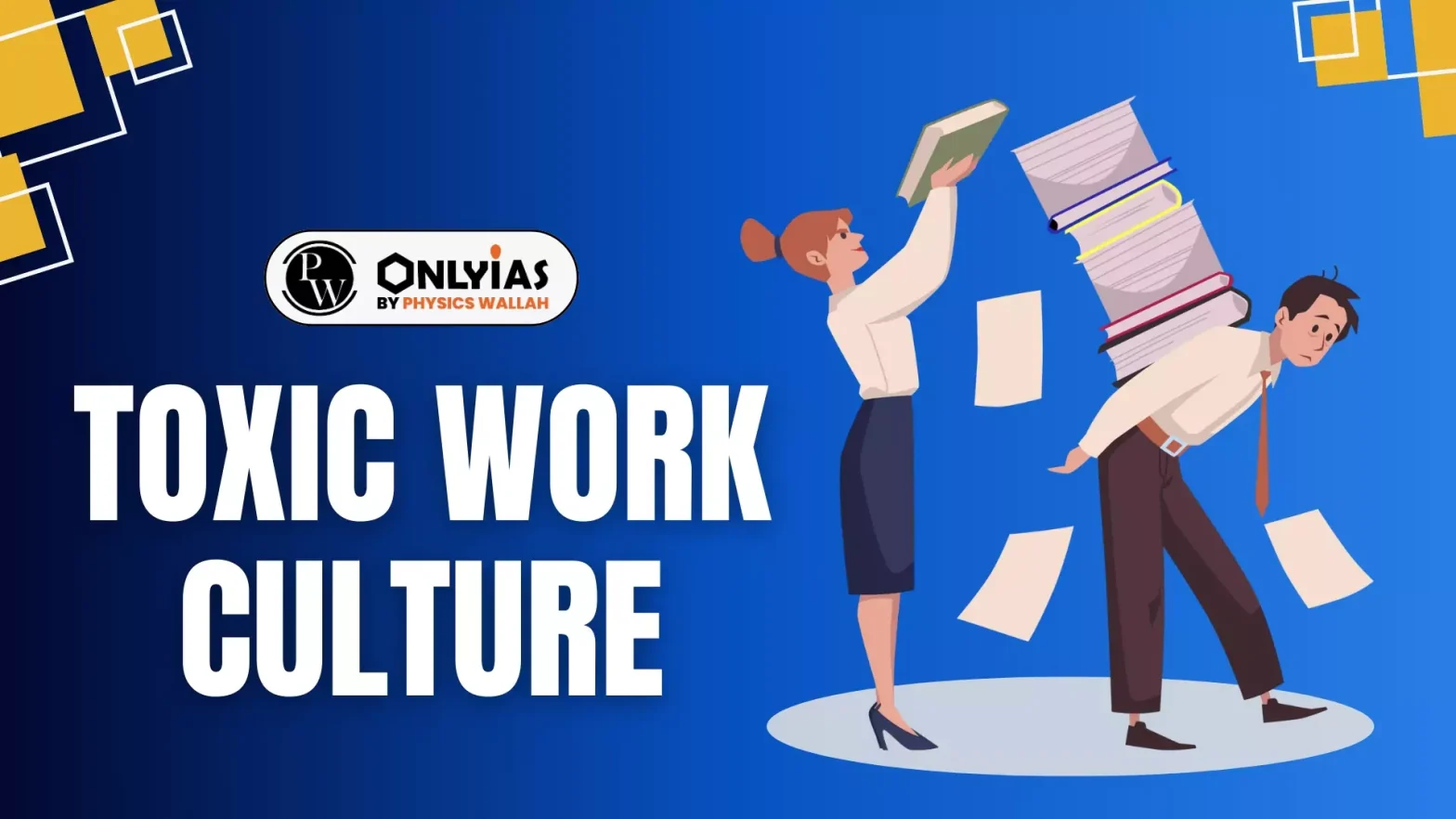Anna Sebastian Perayil, a 26-year-old employee at Ernst & Young (EY) in Pune, passed away on September 9, 2023, allegedly due to a heart attack. She had recently cleared her Chartered Accountancy (CA) exams. In a letter to EY, her mother stated that Anna had appeared to be healthy, but was feeling down due to work-related stress and overwork. This tragic incident has sparked a debate about whether corporate environments are promoting a toxic work culture and highlights a growing concern over mental health and the need for work-life balance in corporate settings.
Over Glorification of Hard Work
- In recent times, particularly in platforms like YouTube, hard work is excessively glorified. While the value of hard work is undeniable, over-glorification can be detrimental. For instance, it is said that in the early days of startups, it’s common to work 18 hours a day, often to the point where individuals eat, sleep, and work in the same space.
- Recently, Infosys founder N.R. Narayana Murthy remarked that youngsters should aim to work 70 hours a week for the purpose of nation-building. Other founders, including those from Ola, echoed similar sentiments, suggesting that there’s nothing wrong with such dedication.
- However, it is now essential to consider the working conditions of employees who are currently working or will be working under such regimes
Enroll now for UPSC Online Course
Does working more hours equate to higher productivity?
- Long hours can lead to mental fatigue, impairing our ability to think clearly and work efficiently. This is why some organisations have implemented a four-day workweek. The underlying belief is that people are meant to enjoy life, not merely exist for work.
- While hard work is necessary for our developing country, it should be balanced with smart work. Simply working harder doesn’t always yield results; in fact, smart work requires adequate time and mental clarity. If someone is working 18 hours a day, how can they think critically and innovatively?
- Another tragic case that highlights this issue is that of Saurabh Kumar Laddha, an IIT and IIM graduate who worked as a consultant at McKinsey & Company. He tragically jumped from the ninth floor, with his suicide attributed to “extreme workplace pressure.” This highlights the urgent need to reevaluate our attitudes towards work and to foster healthier, more sustainable work environments.
| According to NCB (National Crime Bureau) data, there are approximately 50 deaths per week due to workplace stress. |
Reasons for Toxic Culture
- Long Working Hours: Employees are often compelled to work longer hours, commonly referred to as overtime, for which they receive additional pay. For example, if the standard workweek is eight hours, many employees are made to work twelve hours. If they do not comply, they may be told that they are not loyal to the company or that they are only thinking of their own needs rather than the company’s growth.
- Job Market Dynamics: In India, there is a significant disparity between job availability and the number of job seekers. With more individuals searching for jobs than there are positions available, employers often create an environment where employees feel that they are easily replaceable.
- Employees are made to believe that they are not irreplaceable and that the company can find someone else if they do not perform adequately.Moreover, it is often overlooked that employees were recruited through a proper selection process. Instead, they are made to feel that they were given their jobs as a favour, fostering a sense of insecurity and dependency on the company.
- Unrealistic Targets and Expectations: Employees frequently face unrealistic targets, which can create feelings of guilt when they are unable to meet them.
- For example, companies like Byju’s would set unattainable admission targets,but it is impossible to force anyone to enrol. This creates unnecessary pressure on employees.
Check Out UPSC Modules From PW Store
Implications of a Toxic Work Culture for Any Nation
- Health Impact: A toxic work culture can lead to a significant loss of valuable talent and working hours, as many employees experience serious health issues, including chronic illnesses, mental health crises, suicides, and anxiety attacks. This deterioration in employee well-being ultimately hampers productivity and innovation.
- Impact on National Productivity: Consequently, individuals may struggle to contribute effectively to the economy, with the impact varying widely. Some employees may find it difficult to maintain consistent performance over extended periods, while others may be unable to work at all, even for shorter durations. This not only affects individual livelihoods and quality of life but also has far-reaching consequences for national productivity and economic growth. In a broader context, the overall potential of the human capital of the nation could be diminished.
Lessons from Other Countries
- South Korea: South Korea has implemented a fixed workweek of 40 hours, with any additional paid work limited to a maximum of 51 hours. This policy aims to reduce overwork and promote a healthier work-life balance for employees, allowing them to recharge and maintain their mental well-being.
- Australia: In Australia, the “right to disconnect” policy allows employees to switch off from work after hours. Once they leave the office, they can choose whether to respond to work-related calls and messages, fostering a culture that respects personal time and promotes work-life balance.
Conclusion
As Western countries are increasingly adopting measures to protect employee well-being, India faces challenges highlighted by recent cases such as that of Anna Sebastian. The Indian government must prioritise reforms to address workplace cultures that promote excessive hours and unhealthy stress levels. By learning from the experiences of other countries, India can create a more balanced work environment that values employee health and productivity, ultimately contributing to national growth and stability.
Enroll now for UPSC Online Classes
![]() 30 Sep 2024
30 Sep 2024

